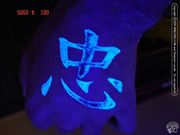UV Tattoos
Not an urban legend, nor a good idea.
While the health concerns are questionable, it is in fact possible to get both blacklight and glow in the dark tattoos.
Shawn Porter describes the difference of glow in the dark tattoos in BME QOD:
Glow in the dark pigment does react under black light; it's true. But UV reactive pigment (to simplify: "black light" pigment) doesn't glow in the dark.
Glowing pigment aborbs and retains light—which is why it "glows" after the light source is removed. Black light pigment absorbs and reflects light as long as the UV light source is present, but returns to normal after it's removed. [1]
Long Term Health Issues
Pigments in the past have been nothing more than boiled down blacklight/glow in the dark poster paint, and are a possible carcinogen.
While the cancerous part has yet to be documented, proven side effects have included contact dermatitis, extreme cases of prolonged itching, as well as the feeling that "this stuff should NOT be in me."
Shawn Porter has both blacklight and glow in the dark tattoos, and while he reports nothing but trouble with his blacklight work (up to and including laser removal to disperse the pigment), he says that he hasn't had a day of trouble with the glow in the dark work.
